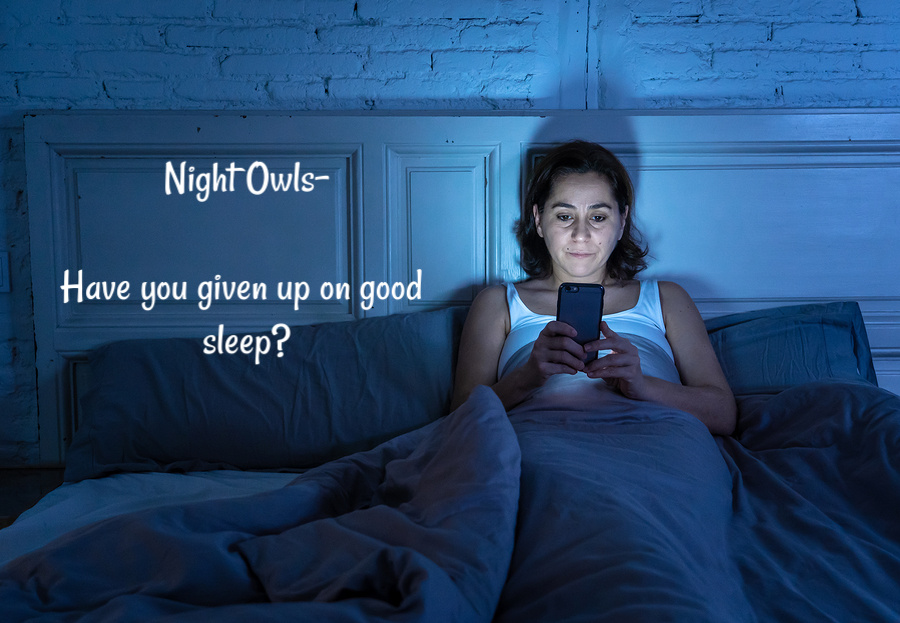By: Lauri Leadley, CCSH, RPSGT- Clinical Sleep Educator|Sleep Coach

Lauri Leadley, Clinical Sleep Educator, President of Valley Sleep Center
If you are a night owl, you probably feel far more energized and productive in the late hours. This also means you might be going to sleep late and waking up late as well.
However, if you are a night owl, your natural tendency to sleep late can prove to be problematic – especially if you need to work normal hours or are required to get up early.
You could end up suffering from sleep deprivation and find it difficult to keep active and maintain your productivity levels.
So, if you are a night owl, my question to you is this – are you sleeping well, or have you given up on the idea of a good night’s sleep?

As a professional sleep coach, I want you to know that you can sleep well even if you are a night owl. Continue reading to find out how you can start sleeping better today.
What makes you a night owl?
Sleep/wake homeostasis and the circadian biological clock help in regulating sleep. If you have been awake for a long period of time, sleep/wake homeostasis tells you that it is time to sleep.
Your internal circadian biological clocks or circadian rhythm are responsible for regulating the timing of sleepiness and alertness throughout the day. Our biological clocks run on a 24-hour light-dark cycle.
The circadian rhythm is not constant throughout the 24 cycle – it dips and rises at different times causing us to feel sleepy or feel alert accordingly.
In some people, their circadian rhythm runs longer making them a night person or a night owl which means they go to bed later compared to the average person. It is important to note here that whether you are a morning person or a night owl, your sleep needs are similar – 7-9 hours of good sleep.
If however, you go to bed late and get up early, it can lead to a number of sleep-related problems including morning sleepiness, sleep deprivation, or sleep-onset insomnia.
How to Sleep Better as a Night Owl
If you are a lifelong night owl, and you don’t plan on changing your sleep pattern or habits, consider shift work that is more suited to your sleeping pattern.
Get Enough Sleep
Make sure you get sufficient sleep so you feel energized and alert when you wake up – if you cut down on your sleeping hours it could lead to sleep deprivation.
Stick to a Regular Sleep Cycle
Maintain a regular sleep schedule and make sure you stick to this schedule even on weekends. Work your way back to eight or nine hours from the time you need to get to work or need to wake up; that is the time you should schedule for sleep. Give yourself a little extra time to settle into bed and fall asleep.
Watch Your Diet and Don’t Skip on Physical Activity
Being awake a few extra hours gives you a chance to consume more calories – night time snacking is tempting but if you are not careful, you could end up eating high-carbs and fatty foods.
Planning a workout regime within the night hours can be a challenge to do this:
- Keep snacking to a minimum.
- Try switching to healthier snacks if you must snack.
- Keep your late meals light and healthy.
- Avoid or limit nicotine, caffeine, and alcohol.
- Plan your workout routine when you are alert and energetic – however, make sure you don’t exercise too close to bedtime so your body has time to wind down.
Remind Yourself that Good Sleep is a Health Priority
March 10th – 16th was celebrated as National Sleep Awareness Week and this year’s theme was “Begin with Sleep.”
The idea was to create awareness about the importance of sleeping well and how it could help people in their personal, family, and professional goals. So, if good sleep hasn’t been a priority for you, this is a good time to rethink your priorities.
Technology presents multiple temptations – games, social media, Netflix. You need to know when to switch off. Remind yourself that sleep comes first and is crucial to good health.
If none of the mentioned suggestions are working and you still find yourself struggling to sleep, visit a professional sleep coach.
Valley Sleep Center – We Can Help You Sleep Better!
If you are a night owl and poor quality sleep is impacting your mental and physical health, we can help you. For a consultation with sleep coach Lauri Leadley, please email us at sleep@valleysleepcenter.com.

